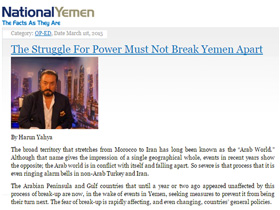
The broad territory that stretches from Morocco to Iran has long been known as the “Arab World.” Although that name gives the impression of a single geographical whole, events in recent years show the opposite; the Arab world is in conflict with itself and falling apart. So severe is that process that it is even ringing alarm bells in non-Arab Turkey and Iran.
The Arabian Peninsula and Gulf countries that until a year or two ago appeared unaffected by this process of break-up are now, in the wake of events in Yemen, seeking measures to prevent it from being their turn next. The fear of break-up is rapidly affecting, and even changing, countries’ general policies.
Saudi Arabia, where Salman has succeeded King Abdullah, is sending out signs of changes in its policy toward Yemen. Until very recently, Saudi Arabia gave Egyptian President Sisi definite backing against the Muslim Brotherhood. However, the Saudi regime that supported the 2013 coup is now keeping more of a distance from Sisi: One can begin to discern a Saudi policy that wishes to draw closer to Turkey and also lighten, albeit slightly, the harsh measures adopted against the Muslim Brotherhood in Egypt.
There is no doubt that this change will also be reflected in the relations between al-Islah, regarded as the political wing of the Muslim Brotherhood in Yemen, and Saudi Arabia. In this case, we will probably see a more powerful Sunni faction emerging against the Houthis.
Indeed, militants from the Houthi Ansar Allah movement, which foresaw this, made their opening gambit by besieging the house of Mohammed Kahtan, one of al-Islah’s leaders. One may regard that move as a measure by the Houthis against the possibility of the opposition’s strengthening by joining forces in Aden; that is because Kahtan was preparing to leave the city of Ibb for Aden. Another opposition figure prevented from leaving for Aden by Ansar Allah militants was Nasserite Unionist People’s Organization secretary general Abdullah al-Noman.
Readers will recall that President Hadi succeeded in traveling to Aden while under house arrest in Sana’a and then withdrew his resignation. In the immediate wake of that, he held meetings with various political groups in Aden and with Abdul Latif Al Zayani, secretary general of the Gulf Cooperation Council. All this shows that Aden has become a center of opposition to the Houthis and it is confirmed by the fact that ambassadors from the Gulf countries and Saudi Arabia have now begun working from Aden.
The Southern Movement, another opposition group in the county, is not standing idly by as the anti-Houthi Sunni faction in Yemen becomes stronger. The Southern Movement accuses Mansur Hadi of usurping the presidency and is holding protest meetings. The movement regards Aden as its own base and is unwilling to see it become a center for Hadi and the Sunni opposition. This attitude will obviously worsen tensions in Yemen. Indeed, al-Jazeera television announced that clashes have already taken place between armed groups affiliated to the Southern Movement and the Yemeni Army in the city of Lahij.
In these days when the different sides are breaking away from one another, Yemen is experiencing the calm before the storm. The storm may break at any moment when the sides conclude that they are strong enough. Once it has broken, we will be confronted by a Yemen in three parts; a Houthi region based in Sana’a, a Sunni region based in Aden and Southern Yemen around Al Mukalla or perhaps some other city.
Although Yemen is not yet officially divided into three parts administratively, it is mentally and politically already divided. If that division is made official, the three countries that emerge will be even poorer than Yemen is now. The Houthis, Sunnis and Southern Movement must therefore realize this at once. All the groups in Yemen must realize that the way to strength, as Almighty Allah says in the Qur’an, is not through division but through unity. It must not be forgotten that Muslims are brothers and that conflict, division and lovelessness are displeasing to Allah.
“Obey Allah and His Messenger and do not quarrel among yourselves lest you lose heart and your momentum disappear. And be steadfast. Allah is with the steadfast.” (Surat al-Anfal, 46)
Adnan Oktar's piece on National Yemen:
http://nationalyemen.com/2015/03/01/the-struggle-for-power-must-not-break-yemen-apart/


